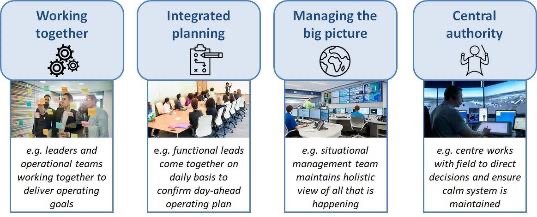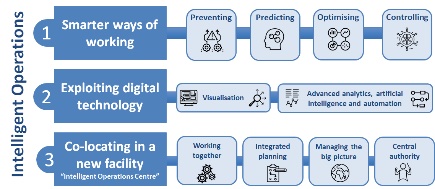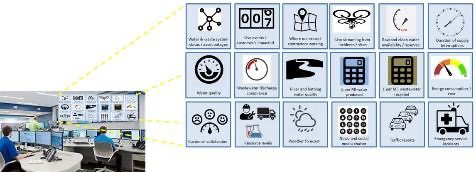Situation
We have made great progress on our transformation journey toward becoming a modern, high performing water utility and we must continue to build on our success and become world class. To achieve our vision, we must look to the future and recognise that the environment in which we operate continues to shift at a rapid pace. Service, regulatory and environmental performance expectations will rise, as will ensuring operational resilience to cope with challenges such as global warming, climate change and customer demographics. There will be an expectation that we will continue to deliver improved customer outcomes at a sustainably lower cost.
During PC21 we will seek to become an “intelligent” organisation; one that focuses more on prediction and prevention than being reactive; closing the gap on other leading water companies. Our Intelligent Operations Hub will be at the heart of this transformation. This Intelligent operations type approach has been adopted by many other water companies and is widely accepted as a key enabler to them progressing towards and beyond an intelligent organisation.
We also recognise that when we return to the workplace we need to utilise our limited time together in the most effective way. We want to create an environment where we can bring our dispersed teams together to work in a more collaborative and intelligent way. The importance of bringing our people together at one physical location are four-fold:

Action
During PC21 we will implement a new operating approach that we call Intelligent Operations. This will be formed by three building blocks of change: smarter ways of working, exploiting digital technology and a new purpose-built facility called “Intelligent Operations Centre”.

Our smarter ways of working include:
- Ensuring a more preventative approach to maintenance of assets instead of fixing when they fail. Also being smarter at carrying our preventative maintenance e.g. maintaining based on use and condition data instead of time elapsed.
- Predicting when issues are about to occur and intervening sooner. This includes moving away from our reliance on customers to have to contact us to inform us that issues have occurred (because we are better informed through the sensors we have on the assets).
- Setting up and tuning our end-to-end water and wastewater system to run in its optimum state. In water for example this means ensuring water quality and pressure is at the right standard while cost of water (£/ML) is minimised.
- More central control of our assets and the work we do on them to avoid issues occurring.
We will make more of our operational data visible to not only provide everyone with understanding of what is occurring, but to engage people in asking ‘why’ something is what it is and what can be done to change/improve it. The visualisation of data is at its foremost in the new situational management suite within our IOC, where teams can see a wide range of information relating to, for example, our assets, our customers, the weather etc. The illustration below shows examples of the nature of data that may in future be displayed in a new situational management suite.

We can access a wide range of digital technologies that can help us understand and predict what might occur as well as automating actions. Specific examples include:
- Toolsets to facilitate the management of high demand surges
- Utilising cost to serve, to give us greater cost insight and awareness of our costs
- Establishment of an energy management desk
Our Intelligent Operations Centre (IOC) will be at the heart of this transformation. The IOC will be NI Water’s next generation central control centre, allowing monitoring, analysis and control from a centralised facility. It will deliver powerful operational insight and forge strong connections throughout our organisation. We will move from a reactive to a more proactive approach to improve customer satisfaction, asset performance and reduce operating costs.
Results
The Intelligent Operations Hub will open in January 2022 and brings together 180 of our dispersed operational staff to work together in a more collaborative and intelligent way. This allows us to consolidate our estate and make way for the Living with Water programme. The technology fitted throughout the facility together with the digital toolsets being developed and deployed within, will help us get ahead of emerging customer issues such as high demand surges and allow us to manage those incidents better.
The establishment of the energy management desk will allow us to monitor on-screen the energy usage across our assets and take action to minimise usage. It will incorporate dashboards to include gas market prices and renewable generation visibility and trends. We will be able to monitor performance across several key assets (water and wastewater) to optimum efficiency levels.
Our innovative Cost to serve platform allows us to be confident we are in control of our costs and drive improvements to meet our business plan targets.
The formation of an Intelligent Operations Hub and the people and technology deployed within, gives us new synergies and actionable insight right across our business and is the key enabler that allows us deliver on our demanding efficiency targets of £2.5m in PC21.